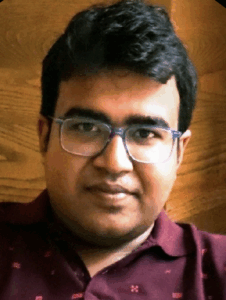Agentic AI themed 4th International Conference on Applied Data Science (ICADS) 2025
-- Agentic AI...--
Free Registration (with a Zoom account; you can get one for free if you don't already have it. This requirement is to avoid Zoom bombing. Please sign in using the email address tied to your Zoom account — not necessarily the one you used to register for the event.):
https://sjsu.zoom.us/meeting/register/RToYlK0nTMitbP-jb4VjBA
Synopsis:
The event is technically co-hosted by Area 4, Region 6 of the IEEE Computer Society.
This virtual event brings together global innovators in data science to share cutting-edge research and practical applications.
The sessions with invited speakers will cover topics related to GenAI and its application. ICADS 2025 offers a dynamic platform for innovation and collaboration. Don’t miss this opportunity to connect with experts and advance the field of data science from the comfort of your own home.
For more details, also check https://r6.ieee.org/scv-cs/icads2025/ (This page on vtools has a word limit)
By registering for this event, you agree that IEEE and the organizers are not liable to you for any loss, damage, injury, or any incidental, indirect, special, consequential, or economic loss or damage (including loss of opportunity, exemplary or punitive damages). The event will be recorded and will be made available for public viewing.
Date and Time
Location
Hosts
Registration
-
 Add Event to Calendar
Add Event to Calendar
Loading virtual attendance info...
- Contact Event Hosts
- Co-sponsored by Vishnu S. Pendyala, SJSU
Speakers
Dr. Vishnu S. Pendyala of San Jose State University
Biography:
Vishnu S. Pendyala, PhD, is a faculty member in Applied Data Science and an Academic Senator with San Jose State University, current chair of the Santa Clara Valley Chapters of IEEE Computer and Computational Intelligence Societies, Area 4 Coordinator for Region 6, and a Distinguished Contributor of the IEEE Computer Society. As a past ACM Distinguished Speaker, researcher, and industry expert, he gave nearly 100 talks and tutorial sessions in various forums such as faculty development programs, the 12th IEEE GHTC, IEEE ANTS, 12th IACC, 10th ICMC, IUCEE, 12th ACM IKDD CODS and 30th COMAD to audiences at venues such as Stanford University, Google, University of Bolton, Computer History Museum, Universidad de Ingeniería y Tecnología, Lima, Peru, IIIT Hyderabad, KREA, IIT Jodhpur, University of Hyderabad, IIT Indore, IIIT Bhubaneswar. Some of these talks are available on YouTube and IEEE.tv. He is a senior member of the IEEE and ACM. He has over two decades of experience in the software industry in the Silicon Valley, USA. His book, “Veracity of Big Data,” is available in several libraries, including those of MIT, Stanford, CMU, the US Congress and internationally. Two other books on machine learning and software development that he edited are also well-received and found place in the US Library of Congress and other reputed libraries. Dr. Pendyala taught a one-week course sponsored by the Ministry of Human Resource Development (MHRD), Government of India, under the GIAN program in 2017 to Computer Science faculty from all over the country and delivered the keynote in a similar program sponsored by AICTE, Government of India in 2022. Dr. Pendyala served on a US government's National Science Foundation (NSF) proposal review panel in 2023. He received the Ramanujan memorial gold medal and a shield for his college at the State Math Olympiad. He also played an active role in the Computer Society of India and was the Program Secretary for its annual national convention.
Address:One Washington Sq, San Jose State University, San Jose, New Jersey, United States, 95192-0250
Dr. Soumen Biswas
Agentic AI: Redefining Autonomy in Intelligent Systems
Agentic AI is reshaping the boundaries of artificial intelligence by enabling systems that move beyond reactive responses to exhibit autonomy, initiative, and adaptability. These agents are capable of independently setting goals, planning multi-step actions, maintaining memory over time, and interacting intelligently with their environments. Underpinned by architectures that combine reasoning, perception, and feedback loops, agentic systems are increasingly deployed in domains such as software automation, robotics, and decision support. As their influence grows, so do the challenges, ranging from safety and value alignment to transparency and collaboration. Agentic AI represents a foundational shift in how intelligent systems are designed and deployed, redefining autonomy for the next generation of AI.
Biography:
Dr. Soumen Biswas is a Senior Researcher in AI and Computer Vision at Hitachi, with a Ph.D. in Computer Vision and Image Processing. His work focuses on advancing intelligent systems through algorithmic innovation and applied AI, with expertise in image segmentation, classification, object detection, and scalable perception solutions.
He has designed and deployed deep learning models across diverse domains, with research published in top-tier journals (SCI, SCOPUS) and presented at leading international conferences, including ICPR, IEEE Big Data, and ICMLA. In addition to his research contributions, he has organized workshops and special sessions at major conferences to foster academic collaboration and knowledge exchange.
Dr. Biswas is also engaged in emerging areas such as Generative AI, Large Language Models (LLMs), Vision-Language Models (VLMs), and Agentic AI systems. His current focus includes multi-modal learning and the development of autonomous agents with reasoning capabilities. He is committed to bridging fundamental research with real-world impact, driving innovation at the intersection of science and technology.
Ranjitha Gurunath Kulkarni
Beyond the Buzz: Defining Agentic AI Systems, Their Capabilities, and the Path Forward
Despite widespread discussion of AI agents across industry and academia, the field lacks consensus on fundamental questions: What exactly constitutes an agent? What problems can current agents realistically solve versus what remains beyond their reach? This talk addresses the clarity gap by examining current agent capabilities and limitations through real-world examples, and establishing concrete problem statements for researchers and practitioners. We’ll identify key research challenges including the need for standardized evaluation frameworks, improved planning mechanisms, and better techniques for agent-human collaboration. The goal is to move beyond the hype and provide a structured foundation for meaningful progress in agent development, complete with proposed benchmarks and a research roadmap that can guide the next generation of agent systems toward solving real-world problems effectively and safely.
Biography:
Ranjitha Gurunath Kulkarni is a Senior ML Engineer at Dropbox with over a decade of experience in NLP-focused applied machine learning. At Dropbox, she plays a pivotal role in building next-generation AI systems, including a cutting-edge LLM-based Agents Platform and the question answering system powering Dropbox Dash. Prior to that, she worked at Microsoft, contributing to research and development in language modeling and speech recognition.
Dr. Utku Kose
Trustworthiness of Agentic AI
In especially the last decade, developments in the field of AI caused transformative changes in the context of modern life. Although deep learning models of the early 2000s allowed enhanced solutions for real-world problems, generative AI models changed the rules of the game and placed AI in the middle of daily life.
As a result, today’s AI systems can deal with more complicated data-driven problems and support humans in many tasks—including even the ones involving intellectual processes. Furthermore, such systems can ensure a networked solution flow through agentic use.
However, one of the most important challenges exposed by such AI formation is trustworthiness. Because agentic AI, through generative and complicated architectures, results in black-box models, there is a critical need for research in ensuring trustworthiness.
Moving from this fact, this speech will be about understanding the need for trustworthiness in Agentic AI and learning about the latest developments in ensuring it. The speech will discuss not only technical solution approaches but also our responsibilities to build human-compatible Agentic AI.
In this context, the speech will also cover advancements in terms of AI policies regarding its management and safety.
Biography:
Dr. Utku Kose received the B.S. degree in 2008 from the Department of Computer Education at Gazi University, Turkey, as the faculty valedictorian. He received his M.S. degree in 2010 from Afyon Kocatepe University, Turkey, in the field of computer science, and his D.S./Ph.D. degree in 2017 from Selcuk University, Turkey, in the field of computer engineering.
Between 2009 and 2011, he worked as a Research Assistant at Afyon Kocatepe University. He then served as a Lecturer and Vocational School Vice Director at the same university between 2011 and 2012. From 2012 to 2017, he worked as a Lecturer and Director of a Research Center at Usak University. He was an Assistant Professor at Suleyman Demirel University between 2017 and 2019, and an Associate Professor there from 2019 to 2024. Currently, he is a Full Professor at Suleyman Demirel University, Turkey.
Dr. Kose has also taught at other higher education institutions such as Gazi University and Istanbul Arel University. He served as a Visiting Researcher at the University of North Dakota, USA (2023–2024), and holds the title of Honorary Professor of Artificial Intelligence at ITM (SLS) Baroda University, India.
He has more than 350 publications, including articles, authored and edited books, proceedings, and technical reports. He serves on the editorial boards of many scientific journals and is one of the editors of the Biomedical and Robotics Healthcare (CRC Press) and Computational Modeling Applications for Existential Risks (Elsevier) book series.
His research interests include artificial intelligence, machine ethics, AI safety, biomedical applications, optimization, chaos theory, distance education, e-learning, computer education, and computer science.
Dr. Anuradha Kar
From Algorithms to Agents: The Role of Agentic AI in Healthcare
The future of healthcare is not just digital—it’s intelligent. Agentic AI represents a paradigm shift in artificial intelligence, moving beyond static models and reactive systems to dynamic, autonomous agents capable of setting goals, making decisions, and adapting over time. Unlike traditional AI, which passively responds to inputs, agentic AI can plan, reason, and act in complex, real-world environments—making it especially suited for the demands of modern healthcare.
In this talk, we explore the emerging role of agentic AI in transforming clinical workflows, decision-making, and patient engagement. From autonomous patient monitoring and adaptive treatment planning to intelligent workflow orchestration, agentic systems have the potential to operate as active teammates to clinicians. We discuss the potential capabilities of agentic AI in learning continuously from patient data, suggesting personalized interventions, and coordinating across departments—all while adapting in real time to new conditions or goals.
We also discuss real-world application scenarios, including cases like oncology support agents that will be able to manage treatment pathways and virtual health assistants that will monitor chronic conditions at home. Alongside these innovations, we examine critical challenges such as explainability, safety, ethical oversight, and integration into existing clinical systems.
Ultimately, agentic AI can offer a path toward more proactive, personalized, and scalable healthcare. This talk presents both the promise and the responsibilities of bringing agentic AI into mainstream healthcare—shifting the role of AI from a passive tool to an active, intelligent partner.
Biography:
Dr. Anuradha Kar is an Associate Professor in AI and Robotics at Aivancity Paris Cachan, France, where she teaches and mentors graduate students in deep learning, AI for health, computer vision, explainable AI, and human-computer interaction.
She holds a Ph.D. in Electrical Engineering from the University of Galway, Ireland. Her research interests lie at the intersection of assistive technologies, digital health, generative AI, and the ethical and fair deployment of artificial intelligence.
She has conducted research at several leading institutions, including the Institut Pasteur in Paris, where she focused on deep learning applications in drug discovery, and the Paris Brain Institute, where she worked on AI-driven analysis of Alzheimer’s disease biomarkers. At the École normale supérieure de Lyon, she developed deep learning techniques for the analysis of 3D bio-imaging datasets.
Anuradha is also an author of two liveProject series with Manning Publications (2021 and 2024), which delve into the use of deep learning and explainable AI in medical imaging workflows.
Kamer Ali Yuksel
The Rise of Autonomous Intelligence: How AI Agents Are Redefining Science, Art, and Business
In this talk, Kamer Ali Yuksel (Head of Agentic AI @ aiXplain) describes how LLM-driven agents are transforming autonomy across research, enterprise, and design. He shows that today’s agents aren’t just “smart autocomplete” but self-directed ideators, experimenters, analysts, and creators. Drawing on his recent publications, he argues that AI agents already deliver end-to-end autonomy: how aiXplain autonomously refine Agentic AI workflows via continuous LLM-driven feedback loops, ideate and implement enterprise Agentic AI use-cases, and derive actionable business insights from enterprise data—producing executive-ready reports without human intervention.
Situating this vision alongside industry milestones—from DeepMind’s AlphaEvolve to Google Research’s AI Co-Scientist and Sakana’s AI Scientist—he demonstrates how AI Agents now drive original research, design and execute experiments, and draft manuscripts; and how he used this framework to power breakthroughs in quantitative finance by uncovering new risk-adjusted performance metrics, portfolio allocation strategies, and technical indicators. He will talk about autonomous creativity too: evolving GLSL shaders, generative art, and highly converting landing pages through user-driven interactive evolution or visual-LLM feedback.
Biography:
Kamer Ali Yuksel is a distinguished AI leader and visionary computer scientist, recognized for his pioneering contributions to AI, ML, and Deep Learning over a career spanning more than two decades. He currently serves as the Head of Agentic AI as a Distinguished Scientist at aiXplain, a Silicon Valley-based no-code AI marketplace/ecosystem and agentification framework founded by Hassan Sawaf, former Director of AI at eBay, Amazon, AWS, and Meta.
Kamer’s previous leadership roles include Chief Data Scientist at Hawk:AI, where he pioneered anti-money laundering and fraud technologies receiving the FinTech Germany Award; and also at ConnectedLife GmbH, where he led the development of AI-powered health and smart living solutions, winning the EIT Health Wild Card Challenge. He continues to push the boundaries of innovation at aiXplain, shaping the future of enterprise Agentic AI technologies
Agenda
| 08:00 to 09 AM | Agentic AI: Redefining Autonomy in Intelligent Systems |
| 09:00 to 10:00 AM | The Rise of Autonomous Intelligence: How AI Agents Are Redefining Science, Art, and Business |
| 10:00 am to 11:00 AM | From Algorithms to Agents: The Role of Agentic AI in Healthcare |
| 11:00 to 12:00 PM | Trustworthiness of Agentic AI |
| 12:00 to 01:00 PM | Beyond the Buzz: Defining Agentic AI Systems, Their Capabilities, and the Path Forward |






